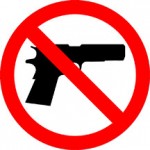by Dave Workman | Senior Editor
 The victims of the terrorist attack in Paris hadn’t even been buried before American gun prohibitionists were attempting to exploit the tragedy to promote their anti-gun agenda, and the attack in San Bernardino, CA, just fueled their campaign.
The victims of the terrorist attack in Paris hadn’t even been buried before American gun prohibitionists were attempting to exploit the tragedy to promote their anti-gun agenda, and the attack in San Bernardino, CA, just fueled their campaign.
Posting on their Facebook page, the Violence Policy Center asserted hours after the Paris massacre, “In light of new concerns over terrorism, we should rethink our policies that allow military-style assault weapons to be purchased by virtually anyone—including potential criminals and terrorists. There is no reason for assault rifles, assault pistols, and assault shotguns to be sold on the civilian market. These weapons are designed with only one purpose: to kill as many people as possible in the shortest possible amount of time.”
And Hillary Rodham Clinton basked in the warm glow of those who idolize her less than a week after the attack when she collected an award from the Brady Center to Prevent Gun Violence for her gun control efforts.
It was as though defeating Islamic State terrorists, and preventing “lone wolf” attacks in this country, was not nearly as important as pushing a public disarmament agenda.
Anyone looking for a more balanced approach might have found it in King County, WA, where Sheriff John Urquhart made headlines because of a leaked memo to his troops encouraging and reminding—not requiring— them to carry their sidearms and spare ammunition off duty. That logic quickly spread to the to other law enforcement officials across the county and to the general public, and to his credit, the sheriff noted that it was not his prerogative to advise for or against concealed carry by private citizens.
“That’s a personal decision,” he said, adding that armed citizens were encouraged to seek competent training.
There is no training requirement for a concealed pistol license in Washington State, and Urquhart revealed to TGM that applications for CPLs virtually doubled over normal on the first two business days following the Paris slaughter. Washington now has more than a half-million licensed citizens, and the number continues to climb.
Following the Paris attack, Fox News’ Greg Gutfeld said on “The Five” that, in his opinion, an armed response to terror attacks would be proper, and incredibly, anti-gun Washington DC, Police Chief Cathy Lanier told CBS’ “60 Minutes” that people who find themselves in the middle of an attack might consider fighting back.
“I always say if you can get out, getting out is your first option, your best option,” Lanier told Anderson Cooper. But she quickly added, “If you’re in a position to try to take the gunman down, to take the gunman out, it’s the best option for saving lives before police can get there.
“And that’s kind of counter-intuitive,” she acknowledged, “to what cops always tell people, right? They always tell people don’t, you know, don’t take action, call 911, don’t intervene in the robbery, y’know; we’ve never told people take action. It’s a different, this is a different scenario.”
That quickly set off a chain reaction from gun rights advocates, who argued that – especially in the District of Columbia where Lanier has been reluctant to issue carry permits—it is pretty hard to shoot back if you have nothing to shoot with.
Surprisingly, the press actually did start talking about the problem with French gun laws, especially after Republican front runner Donald Trump, during remarks in Beaumont, TX, on the day after the attack contended that the outcome might have been different, had some of the victims been armed.
Meanwhile, the New American observed that strict French gun laws not only didn’t work, but had put gun control proponents in a political corner.
“Much handwringing and declarations of vengeance emanated from French politicians who appeared to have been caught by surprise,” The New American reported. “After all, as recently as 2012 those very same politicians enacted even more draconian gun laws in order, they said, to keep this from happening again.”
That was a reference to a shooting spree launched by Mohamed Merah, described as “a French jihadist of Algerian descent” who gunned down seven people in a trio of attacks around Toulouse just five days after tough gun laws took effect in March 2012.
The Guardian, a popular British news organ, also reported on how the Paris attack would bring new scrutiny to gun control problems not just in France, but all over Western Europe.
And even a public relations news organ, O’Dwyer’s, headlined a story, “Paris Slaughter Puts Focus on Strict Gun Laws.”



